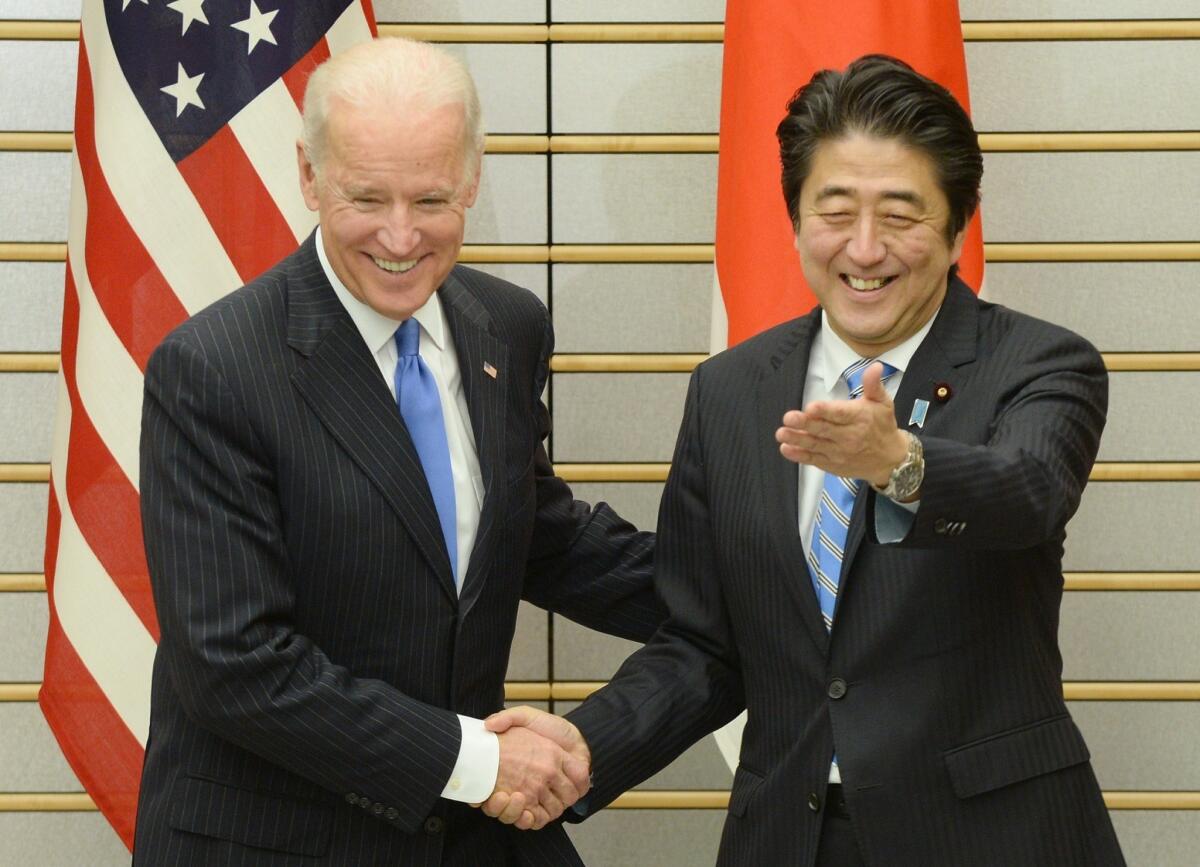Biden on delicate diplomacy mission after tension with China

- Share via
BEIJING — How to reassure Japan and South Korea that the United States will stand behind them, without inflaming the Chinese?
That is the mission that stands before Vice President Joe Biden as he arrives in the region with a potential crisis developing over China’s designation of a large swath of the East China Sea as an air defense identification zone.
The trip, which was supposed to advance economic ties in the region, has been waylaid by China’s Nov. 23 declaration of an air defense zone over waters controlled by Japan and South Korea.
[Updated 6:53 a.m. PST Dec. 3: “This action has raised regional tensions and increased the risk of accidents and miscalculation,” said Biden on Tuesday in Tokyo, the first stop on his week-long Asia tour. At a joint press conference with Japanese Prime Minister Shinzo Abe, he called for “crisis management mechanisms and effective channels of communication between China and Japan to reduce the risk of escalation.”
Chinese officials, meanwhile, expressed hopes that they could move beyond the air defense identification zone to deal with other issues. “Both countries should cement trust, efficiently control differences and facilitate new progress of our relations,” said foreign ministry spokesman Hong Lei at a briefing on Tuesday.]
“The timing couldn’t be worse,” said Ralph Cossa, a retired Air Force colonel and president of the Pacific Forum CSIS in Honolulu. “The frustrating thing I’m sure for Biden and company is that they spent a lot of time preparing and the announcement of the air defense identification zone has completely recast the trip.”
The United States has rejected China’s demand that it submit advance flight plans and maintain radio contact before flying over the restricted waters. That defiance was underscored by the flights last week of two American B-52 bombers through the zone. Japanese and South Korean planes have since flown through as well without advance notice.
In the first stop of the weeklong tour, Biden touched down in Tokyo to meet with Japanese Prime Minister Shinzo Abe, a hard-liner. The hope was to coordinate the Japanese and U.S. responses, which have appeared at cross-purposes as a result of the U.S. decision that passenger airlines should comply with the Chinese request for advance notification. On orders of the Japanese government, major commercial air carriers Japan Airlines and All Nippon Air have refused.
The visit also served as something of a coming-out party for the United States’ famous new envoy to Tokyo, Caroline Kennedy, who took up her post just last month.
Biden was due to arrive Wednesday morning, local time, in Beijing, where his reception may be less congenial. Although Biden personally is said to have a good relationship with Chinese President Xi Jinping, until earlier this year vice president, the Chinese leadership appears furious at the U.S. reaction to the air defense zone.
The display of U.S. power in the Pacific with the flight of the B-52s surprised and angered the Chinese. They have accused Japan and the U.S. of overreacting. Roughly 20 countries have air defense identification zones, but unlike China, the others do not include territory controlled by other nations. The disputed flyspeck islands, known as the Senkaku to the Japanese and Diaoyu to the Chinese, which have been controlled by Japan since the late 19th century, lie in the center of the new air zone.
“So many other countries set up air defense zones decades ago. Our problem is we are doing it too late. Everybody is afraid that China is becoming too strong too fast,” complained Xu Guangyu, a retired Chinese military officer and a consultant with the China Arms Control and Disarmament Assn.
At a regular briefing on Monday, Chinese foreign ministry spokesman Hong Lei said China is trying to diffuse tension over the new zone.
“China has communicated with related countries … and urges them to understand China’s legitimate security concerns and right to self-defense,” said Hong.
U.S. officials are urging the Chinese to rescind the designation of the zone, a step that seems unlikely.
“We consider it a unilateral effort to change the status quo in the East China Sea. It’s a provocative action, an uncoordinated action at a time tensions already are running high, and that this is not the kind of thing that contributes to the greater peace and security in northeast Asia,” a senior administration official said on Monday while briefing reporters on the way to Japan.
ALSO:
Egypt arrests prominent secular political activist
Syria’s Bashar Assad implicated in war crimes, U.N. rights chief says
As protesters take square, Ukraine president appears to give ground
Twitter: @BarbaraDemick
More to Read
Sign up for Essential California
The most important California stories and recommendations in your inbox every morning.
You may occasionally receive promotional content from the Los Angeles Times.










